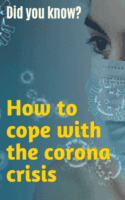The Coronavirus disease (COVID-19) has reached South Africa and we all need to be responsible and follow official health guidelines and procedures to stop the spread of the virus.
We also need to support each other and be kind, considerate and compassionate in this stressful time, especially to those who are the most vulnerable to contracting the disease – the elderly and people with weak immune systems due to chronic conditions.
The virus is spread through direct contact with an infected person, or through touching something that an infected person has also touched, and then touching your nose, mouth or eyes. The virus travels in droplets so when a person sneezes or coughs, it travels in the drops from their mouth or nose into the air and can infect those that the drops land on, or surfaces they land on.
The symptoms of the Coronavirus are similar to those of flu – a dry cough, a fever and often difficulty breathing. The majority of people recover, with only a small percentage dying of the disease – mostly the elderly and those who have other illnesses or health problems. Many people will get the virus mildly with a low fever and cough. Some won’t get any symptoms at all, but can still carry the virus and pass it on as it is highly contagious, and spreads much faster than common flu.
Here are some things that you can do to help you to stay healthy and safe
Wash your hands frequently for at least 20 seconds with soap and water. You can also use hand sanitiser, but it has to be at least 60% alcohol. Sanitiser is also becoming hard to find in shops, and soap and water works well. It is really important to wash your hands before eating and if you have come into close contact with other people, for example when you travel on public transport.
Clean things you touch and handle often like your cellphone, and things that other people have used, like keyboards and laptops.
Cough or sneeze into a tissue, then throw the tissue in a bin. If you don’t have a tissue, cover your mouth and nose into your elbow if you sneeze or cough.
Avoid anyone with flu-like symptoms.
Try to avoid touching your mouth, nose or eyes with unwashed hands, and be particularly careful on public transport or in crowded places.
Don’t share snacks from packets or bowls that others are dipping their fingers into.
Facemasks should only be worn by infected individuals to reduce the risk of transmitting the infection to other people. They are hard to find, and if you are infected you can also use a cloth or scarf to cover your nose and mouth if you have to go out in public.
Social distancing is important. Although physical contact is important for us as people, we need to keep some distance from others to stop the virus from spreading. (This is why schools have been closed.) We need to keep some space between us and others where possible. We also need to find new ways to show affection or to greet people, like the elbow bump, as hugging and kissing is out for now! This is all called ‘social distancing’.
It is important to boost your immune system which helps your body to fight diseases.
Eat a balanced healthy diet with lots of fruit and vegetables (five fruits and vegetables a day is recommended). Beans and lentils are also very good to keep your immunity strong and there are lots of nice dishes you can make with them from samp and beans to curries!
Try to cut down on sugar as this lowers your immunity and makes it harder for your body to fight disease.
Keep active! Your white blood cells fight disease and it is important to keep them moving. Doing exercise gets your blood flowing and your white blood cells in your blood move too. Do some exercise every day, even if it is just walking fast to get your heart rate up. You should do at least 150 minutes a week of moderate exercise or 75 minutes of vigorous activity. Older people can do whatever exercise is possible.
Get enough sleep and try to reduce your stress levels! Your immune system is also affected by stress and this can be made worse by lack of sleep. When we are tired our bodies can’t cope so well. Try to relax as much as you can and not panic. Also, we need to support each other – sometimes it helps just to talk and share our feelings of anxiety. We are all in this together!
The important thing is to keep calm and not be overwhelmed by the fear of this virus. At this stage these safety precautions are to stop a crisis from happening, not because the crisis is already happening. And, if we all follow these steps, then perhaps SA can avoid the problems that other countries are facing with many people sick all at the same time.
We need to be kind and recognise that we are all in this together. The Coronavirus is not selective and we are all at risk. It is important not to blame people who have contracted the virus or to make them feel rejected. It could just as easily be us!
***
Useful links and numbers:
If you suspect you have the Coronavirus call this number: 0800 029 999
To keep updated, WhatsApp ‘hi’ to 0600 123 456. This is the South African Coronavirus information centre.
Take a look at South Africa’s official site on coronavirus here.
This is a global problem. Follow the World Health Organisation (WHO) here.
Read President Ramaphosa’s address on Coronavirus in bullet points here.
There is also an earlier FunDza blog about the background to the virus. Read it here.


